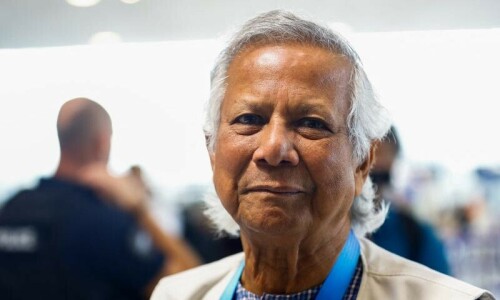• Schools closed for another 10 days across the province
• Marriyum says arrangements made in hospitals to treat patients
• Govt holds ‘successful’ cloud seeding trial in Jhelum, Gujar Khan
LAHORE: The Punjab government has declared an emergency in Lahore and Multan, where a “complete lockdown” will be imposed from Fridays to Sundays due to the intensity of smog.
Dense smog, caused by toxic pollutants, has engulfed several cities in Punjab over the past few weeks, with Lahore and Multan being the worst hit. The AQI reading in Multan has already crossed 2,000 twice, setting a new record for air pollution.
“We are declaring a health emergency in Lahore and Multan,” provincial minister Marriyum Aurangzeb told a press conference on Friday.
The minister said a complete lockdown will be enforced on Fridays, Saturdays, and Sundays in both cities.
Construction activities in Lahore and Multan have also been suspended for 10 days, and vehicles carrying construction materials will be stopped at the entry points of the cities.
Ms Aurangzeb said the closure of schools has been extended while colleges and universities will hold online classes in Lahore and Multan.
Private and government offices would operate with 50 per cent of staff working from home, while restaurants would operate till 4pm with takeaway services allowed till 8pm.
“We are not imposing restrictions on weddings during this smog season but are preparing for next year,” she said, adding that citizens have been advised to avoid outdoor events.
Late, on Friday, the provincial Environmental Protection Agency (EPA) notified these restrictions.
It said the smog situation is “likely to prevail for a few weeks”; hence, there was a need to “reduce the number of vehicles on roads and restrict construction activities”.
Schools across Punjab, which are already closed, would remain shut till Nov 24, according to the EPA notification.
There will be a complete ban on the entry of heavy transport vehicles in Lahore and Multan.
The vehicles carrying fuel, medicines and food supplies; buses with official certification; ambulances; fire brigades; and vehicles of Rescue 1122 and police will be exempt from the ban.
The lockdown restrictions will not apply to pharmacies, medical facilities, petrol pumps, oil depots, tandoors, flour mills, dairy shops, call centres, postal services and utility companies.
Health crisis
The minister admitted that smog has resulted in a sharp uptick in the number of patients with respiratory illnesses.
The timing of the outpatient department (OPD) has been extended till 8pm in hospitals where essential medicines for respiratory illnesses have also been supplied, the minister said.
Ambulances have been equipped with breathing apparatus and hospital staff leaves have been cancelled. Citizens are advised to wear masks and avoid unnecessary travel on motorcycles.
According to the EPA notification, special counters for smog-related diseases will be established in all government and private hospitals.
Rescue 1122 will “prioritise the calls related to smog diseases” while the health department will ensure an adequate supply of medicines to treat respiratory and other smog-related diseases
10-year policy
While calling smog a “health crisis”, she said the pollution is now affecting other districts in Punjab.
The minister claimed that a 10-year policy had been formulated and government departments have been given specific targets to combat this crisis.
“Twelve AQI calculators have been installed in Lahore, and 50 more will be deployed across Punjab this year,” she added.
The minister lamented Lahore has only 3pc green cover compared to the required 36pc. “The government plans to launch a citywide green plantation drive.”
She said smog would not disappear in six months or a year, and the government is using both short- and long-term strategies to address the issue.
The minister, once again, reiterated that smog was cross-border and urged Pakistan and India jointly “address this environmental crisis, which concerns lives and health”.
The minister said she would like to brief the Lahore High Court on the policy to curb smog, which, she said, was caused by “transport, agriculture, energy, our habits, our behaviour and our actions towards nature”.
She said a number of measures have already been taken to curb smog.
For the first time, the agriculture department has provided 1,000 super seeders to farmers to dispose of their stubble instead of burning it.
Around 800 brick kilns have been demolished, and efforts to expand Lahore’s forest cover are ongoing, she added.
Three vehicle fitness certification stations have been established at Kala Shah Kaku and Thokar Niaz Baig, and smoke detectors have been provided to traffic police to identify vehicles with high emissions.
Cloud seeding
On Friday, the Punjab government also held a successful trial of artificial rain using local technology.
“The cloud seeding experiment conducted in Jhelum, Chakwal, Talagang, and Gujar Khan resulted in rainfall in Jhelum and Gujar Khan on Friday,” the Meteorological Department confirmed.
The experiment was conducted at 2pm, and “within hours, it [rained] in Jhelum and Gujar Khan”.
“There is also a strong likelihood of rainfall in Lahore after this experiment. The artificial rainfall will significantly help reduce smog,” the Met Department said.
The experiment was done in collaboration with Army Aviation, Punjab EPA and Suparco, as per the officials.Ms Aurangzeb and CM Sharif have congratulated all institutions and scientific experts involved in the cloud seeding experiment.
Published in Dawn, November 16th, 2024

















































Dear visitor, the comments section is undergoing an overhaul and will return soon.